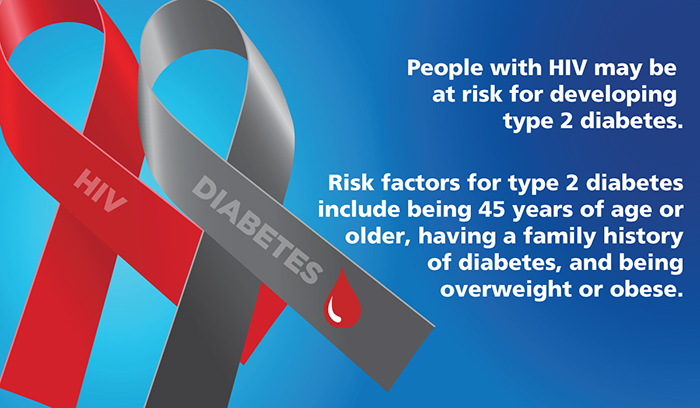Side Effects of HIV Medicines
HIV and Diabetes
Last Reviewed: August 10, 2021
Key Points
- Diabetes is a disease that develops when levels of glucose in the blood (also called blood sugar) are too high. There are different types of diabetes. Type 2 diabetes is the most common type.
- People with HIV are more likely to have type 2 diabetes than people without HIV. Risk factors for type 2 diabetes include being 45 years of age or older, having a family history of diabetes, and being overweight or obese.
- People with HIV should have their blood glucose levels checked before they start taking HIV medicines. People with higher-than-normal glucose levels may need to avoid taking some HIV medicines.
- A healthy diet and regular physical activity can help prevent, delay, or manage type 2 diabetes. In addition, there are also medicines that can help manage type 2 diabetes.

What is diabetes?
Diabetes is a disease that develops when levels of glucose in the blood (also called blood sugar) are too high. Glucose comes from the breakdown of the foods we eat and is our main source of energy.
Over time, diabetes can cause serious health problems, including heart disease, stroke, kidney disease, eye problems, and nerve damage.
There are different types of diabetes, including type 1 diabetes, type 2 diabetes, and gestational diabetes. This fact sheet discusses type 2 diabetes, which is the most common type of diabetes.
What are the risk factors for type 2 diabetes?
Risk factors for type 2 diabetes include being 45 years of age or older, having a family history of diabetes, being overweight or obese, and lack of physical activity. People whose family background is African American, Alaska Native, American Indian, Asian American, Hispanic/Latino, Native Hawaiian, or Pacific Islander American are at greater risk of type 2 diabetes.
People with HIV are more likely to have type 2 diabetes than people without HIV. Additionally, some HIV medicines may increase the risk of type 2 diabetes in people with HIV.
What are the symptoms of diabetes?
The symptoms of diabetes can include:
- Increased thirst
- Frequent urination
- Increased hunger
- Unusual weight loss
- Fatigue
- Blurred vision
- Tingling or numbness in the hands or feet
- Sores that do not heal
People who have symptoms of diabetes should get tested for the disease. Testing is also recommended for people with certain risk factors for diabetes. Blood tests are used to measure blood glucose levels and diagnose diabetes.
Should people with HIV get tested for diabetes?
People with HIV should have their blood glucose levels checked before starting treatment with HIV medicines. People with higher-than-normal glucose levels may need to avoid taking some HIV medicines.
Blood glucose testing is also important after starting HIV medicines. If testing shows high glucose levels, a change in HIV medicines may be necessary.
How can a person prevent, delay, or manage type 2 diabetes?
You can take the following steps to lower your risk of developing type 2 diabetes:
- Maintain a healthy weight. If you are overweight, lose weight and keep it off.
- Eat healthy. Eat a variety of healthy foods and limit foods high in fat, sugar, and salt.
- Keep moving. Aim for 30 minutes of physical activity on most days of the week.
People who have type 2 diabetes can also follow these steps to manage the disease. In addition, some people may take medicine to manage their type 2 diabetes. To learn more, visit the Managing Diabetes webpage from the National Institute of Diabetes and Digestive and Kidney Diseases (NIDDK).
If you have HIV, talk to your health care provider about your risk for diabetes.
This fact sheet is based on information from the following sources:
From the Department of Health and Human Services:
- Guidelines for the Use of Antiretroviral Agents in Adults and Adolescents Living with HIV:
From the U.S. Department of Veterans Affairs:
From NIDDK:
Also see the HIV Source for a collection of HIV links and resources.
Read more here
